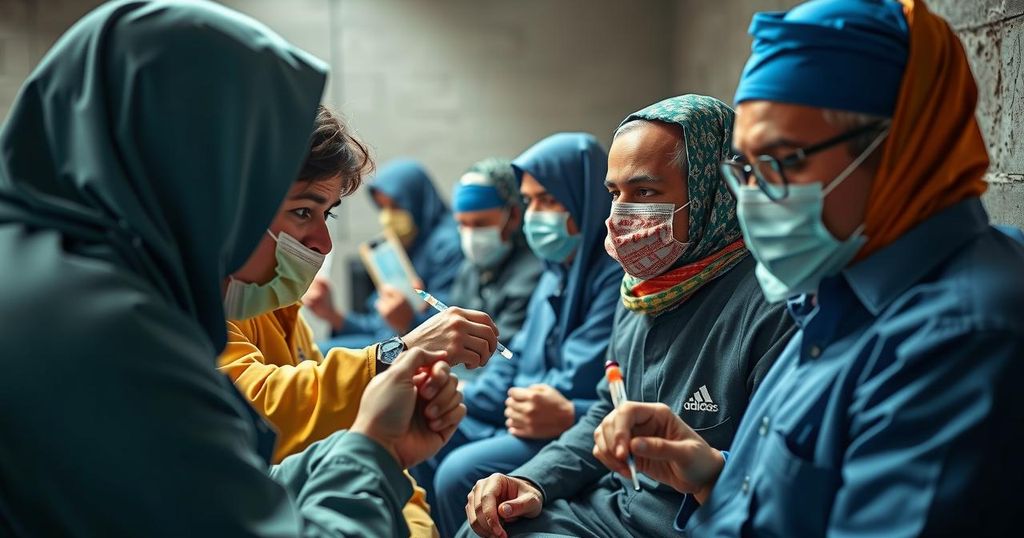Pakistan and Afghanistan Intensify Polio Vaccination Efforts as Cases Rise

Pakistan and Afghanistan have launched simultaneous polio vaccination campaigns amidst a surge in cases, with 64 infections reported this year—41 in Pakistan and 23 in Afghanistan. Over 45 million children in Pakistan are targeted, while Afghanistan aims to vaccinate 6.2 million children in 16 provinces. Challenges include vaccine hesitance and violence against health workers, which pose significant threats to eradication efforts.
On Monday, Pakistan and Afghanistan simultaneously commenced new polio vaccination campaigns in response to a worrying spike in cases. These two nations remain the sole countries worldwide where the poliovirus continues to be endemic, resulting in the paralysis of children. According to the World Health Organization, there have been 64 reported polio infections this year—41 cases in Pakistan and 23 in Afghanistan, a significant increase from only six cases reported in each country in 2023. Pakistani health officials have launched a comprehensive, week-long house-to-house vaccination initiative that will utilize 400,000 polio workers. This campaign aims to immunize over 45 million children under the age of five against this debilitating disease. Ayesha Raza Farooq, the Prime Minister’s special assistant on polio eradication, stated, “This is Pakistan’s third nationwide campaign this year, launched in response to the alarming increase in polio cases across 71 districts.” The surge in infections this year is particularly concentrated in Balochistan province, which borders Afghanistan, indicating a critical area facing intense transmission of the poliovirus. The southern province of Sindh has reported 12 cases, while other regions in the populous nation of over 240 million people have contributed to the remaining infections, as provided by the polio eradication program. Anwarul Haq, the coordinator for the National Emergency Operations Center for Polio Eradication, urged parents to collaborate with health teams to safeguard their children, emphasizing that polio has no cure. He remarked, “With the threat at an all-time high, we must act as one nation to keep our children safe through vaccination.” The rise of the poliovirus in Pakistan has been attributed to vaccine hesitance in rural areas, fueled by misinformation suggesting that vaccination campaigns are a Western scheme to sterilize Muslim children. Additionally, health workers and their police escorts have faced violence in regions plagued by militant activity, leading to tragic fatalities among both vaccinators and law enforcement this year. In Afghanistan, health officials announced a three-day polio vaccination campaign targeting 6.2 million children under the age of five in 16 provinces, focusing mainly on areas adjacent to the Pakistan border. However, this initiative commenced after an unexpected nearly two-month delay, during which the Taliban authorities suspended house-to-house vaccinations in Kandahar without public justification, instead opting for site-to-site and mosque-to-mosque outreach. An independent monitoring board for the Global Polio Eradication Initiative recently reported that the Taliban’s decision stemmed from apprehensions regarding security and covert surveillance activities in Kandahar, a crucial location under Taliban governance. The group’s strict interpretation of Islam has led to additional societal challenges, such as the prohibition of most women from public and private employment and the barring of girls from receiving education past the sixth grade. WHO officials assert that effectively eradicating polio in Afghanistan necessitates the inclusion of large migrant populations in vaccination campaigns, addressing opposition to vaccination among specific groups, and establishing a female public health workforce to address the multiple obstacles hindering efforts in this destitute nation.
Polio, or poliomyelitis, is a debilitating viral disease that predominantly affects children under five years of age, potentially leading to permanent paralysis. The disease has been eradicated in many parts of the world, but Pakistan and Afghanistan continue to face persistent challenges due to cultural, political, and logistical factors. Vaccination campaigns in these countries have frequently encountered resistance from local populations, influenced by misinformation and fear. Additionally, security concerns due to violence against health workers complicate the implementation of immunization initiatives, making robust public health strategies essential for controlling polio transmission and ultimately eradicating the disease.
In summary, both Pakistan and Afghanistan are intensifying their efforts to combat the resurgence of polio through comprehensive vaccination campaigns aimed at protecting millions of children. The increase in polio cases is attributed to various socio-political issues, including vaccine hesitance fueled by misinformation and violence against health workers. Both nations recognize the urgent need for cooperative efforts and strategized outreach to address these concerns and reinforce the importance of immunization in safeguarding future generations against this preventable disease.
Original Source: www.voanews.com








